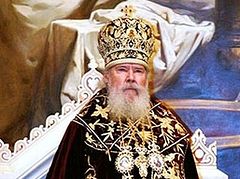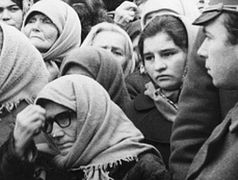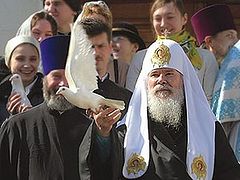In this interview, originally given on the eve of Pascha in 2006, His Holiness Patriarch Alexei II of Moscow and All Russia recalls his favorite Paschal memories from childhood and from throughout his clerical ministry, and also reflects upon several issues that were facing the Church at that time. Some of the topics touched upon reflect the specific time in which the interview was given—for example, His Holiness speaks of the hopes for the Moscow Patriarchate’s reunion with the Russian Church Abroad, which occurred a year later on Ascension Day in 2007. However, it can still be edifying to see with what spirit and joy the patriarch addresses these topics, and how he views everything through the lens of the resurrected Christ.—Trans.
—Your Holiness, what are your earliest memories of Paschal celebrations from your childhood?
—Holy Pascha is generally the first feast that’s imprinted in my memory, and it’s one of my brightest childhood impressions. The main feeling I have connected with this recollection is incomparable joy—a special joy: Paschal joy.
I was four then. My parents and I were parishioners of St. Alexander Nevsky Cathedral in Tallinn. That’s where it all happened.
My first Paschal cross procession is clearly alive in my memory as if it was yesterday. Everything around was very solemn and festive. The night was illuminated by many candles and joyous faces. And, despite the late hour, I absolutely didn’t want to sleep…
As you know, the Paschal cross procession symbolizes the procession of the Myrrh-bearing Women to the tomb of the Lord. My parents had already explained this to me, as well as a lot of other things that happens during the feast. They tried to make me a real participant in this wondrous event, and, as much as possible for a child, to feel its joy and depth. For the first time that night my still weak childish voice joined the powerful conciliar voice of the Church, which glorified the Risen Lord:
“Christ is risen from the dead, trampling down death by death, and upon those in the tombs bestowing life.”
—Has your perception of the “Feast of Feasts” greatly changed since then?
—Of course, man cannot remain unchanged throughout the years, and it’s completely natural. I can say that in a certain sense the nature of my spiritual joy in the Paschal days has undergone a change. My faith has become deeper and more substantial, probably through experience and as a result of the work on my soul. Therefore, much in my perception of the feast is experienced as sharper and brighter. But the childlike delight from that incomparable celebration continues to live in my heart.
I am sure that such feelings and experiences are shared by a great many believers. Year after year, spiritually accompanying the Myrrh-bearing Women, we successively experience fear, astonishment, and awe at the view of the stone miraculously rolled away from the entrance to the Savior’s tomb by an invisible power.
We celebrate an event that is inexhaustible in its content and meaning. With age, awareness of this becomes deeper and more voluminous, and sprouts forth new meanings. After all, the Resurrection of Christ is a deeply personal matter for every Christian. The Lord, offering Himself as a voluntary sacrifice, delivered the whole of mankind from death, that fearful consequence of the original sin of Adam and Eve, and opened the path to salvation for every one of us.
The Resurrection of Christ is not only the greatest miracle in the history of the world. Our entire faith stands upon it as upon an immovable rock.
As the apostle says, And if Christ be not risen, then is our preaching vain, and your faith is also vain (1 Cor. 15:14).
But He is risen, and the Resurrection of the Savior is our great Paschal celebration.
—What other Paschal services, besides that first one, do you remember something special from?
—I have many memories connected with Paschal celebrations. The bright Resurrection of Christ becomes a bright, unforgettable event for me every time. It would take a long time to talk about it. Much of what was experienced in such days was determined by the times.
Of course, I well remember the Paschal days in my first parish. I have bright and lively images from that time. I was twenty-one when I was ordained as a priest and appointed as the rector of a church in the mining town of Tartu. Church life was only just beginning to revive there. Together with the parishioners we repaired the church and developed the parish life. I often had to face human grief because there were many fatal accidents in the mines. But my first parish was unforgettable, with all its burdens, its problems, and its joys.
And I remember 1962, when the Soviet government in Tallinn banned the Paschal procession, supposedly because of hooliganism during the nighttime service. And I, a young bishop, obeyed the first year—I served in the morning on Pascha. I served and realized: This won’t do! There is no lifegiving Paschal joy in either the clergy or the faithful. The next year I decided, what will be will be, but I’m going to serve at night, as is customary for Orthodox people, as we did on that first, memorable Pascha of mine. I didn’t ask for any permission or coordinate it with anyone. I was relying on God’s help. A lot of people gathered; everyone was worried, but it didn’t spoil the solemnity of the moment. I began to serve Matins after the procession, as it should be, so that everyone present would feel the feast. Of course, there was no hooliganism or spiteful shouts. The Paschal services began to be celebrated at night again from that time on. For believers this is no small thing. And I had a special joy: I did not succumb but defended the Church’s rights.
—But did the authorities’ reaction ensue?
—For some reason, it all passed. It turns out, the godless authorities could be resisted. Or maybe they didn’t think it was worth it to get involved with such “trifles.” They had prepared blows for our most tender points—the monasteries were subjected to persecution. The vast majority of them were closed without any explanation. The same threat hung over the Holy Dormition Pukhtitsa Convent at that time. My parents would take me there as a child… So this story is also in some sense rooted in childhood memories. Inspired by the Paschal precedent, I took up a seemingly hopeless cause—protecting this monastery, especially dear to my heart, from the arbitrariness of the authorities. And another miracle occurred: We managed to defend the monastery.
I have many other memories also connected with Paschal days. Every festal service is experienced so deeply every time that they’re remembered as something special, leaving an indelible trace in the soul.
—What points in the Gospel readings during the Paschal services especially touch you, Your Holiness?
—I think it would be everything connected with the Evangelists’ stories about the appearance of the Risen Christ to the disciples. Together with them we perceive the Risen Lord and Savior with our hearts. We meet Him. We hear His words: Peace be unto you. This meeting gives us strength and Paschal joy. The Evangelists’ testimonies about the Resurrected Christ cannot but touch us and deepen our faith.
—Your Holiness, can the joy of the Resurrection also be attributed to a process like the rebirth of faith and the Church in our country? It’s already being called the second Baptism of Rus’.
—I served the last Presanctified Liturgy before Pascha today [April 19—ed.]. There were about 400 people in Christ the Savior Cathedral. This was on a weekday, a work day. There were especially many worshipers this year all throughout Great Lent. It’s a testimony that people are returning to faith. And the feast of Pascha is the culmination of all our Great Lenten prayers and services. And this meeting with the Resurrected Savior is the common joy of the people.
Of course, in human life, everything is intertwined—both joy and sorrow. On April 26, in Paschal tide, we will remember the twentieth anniversary of the Chernobyl disaster. We printed a patriarchal gramota for the recovery workers of the Chernobyl catastrophe. We wanted to somehow support these people. Many of them lost their health but have lived to see the twentieth anniversary of this catastrophe, which we all experienced. May God grant that they continue to live and show an example of selfless devotion to their homeland in overcoming tragedy and suffering.
—We are now on the eve of a possible unification with the Russian Church Abroad, that is, in a particular sense, the rebirth of the united Russian Church. The upcoming All-Diaspora Council could be an important step. There are not only many hopes around this, but discussions also. There is not a little pressure on the participants in the Council, first of all on the head of the Church Abroad, Metropolitan Laurus…
—From his own, and from others!
—How do you feel about it?
—I wrote a letter to Metropolitan Laurus yesterday in which I support him spiritually in these difficult days for him; because there are forces for whom such a rapprochement is not acceptable. Something similar happens, by the way, in political life. Take, for example, the integration processes in Western Europe. What enthusiasm there was when the Deutsche Marl appeared! And now the common currency, the euro, is in demand. Visa-free travel is available, and they welcome everyone. But when Russia builds closer ties with Belarus or the Moscow Patriarchate with a part of the Russian Church, which wound up abroad due to political events, there are many opponents who try to prevent this. All the powers of evil rise up against it. But we hope all the same that sanity will prevail. There is no reason why the Russian Church Abroad and the Moscow Patriarchate should be divided today. The more time passes, the less the Russian Church Abroad will remain Russian. Therefore, now, perhaps, is already the last chance to unite into one Church the two branches of the Russian people, which, as a result of the tragedy of 1917 was divided due to political reasons. We bow down before the struggle of the Russian emigration, which endured severe trials but preserved love for Russia and the Orthodox faith. Now it’s already the second and third generation of the white Russian emigration. Spiritual unity with the motherland is very important for them. We’re open to reuniting, and we pray for all those who are planning to go to the All-Diaspora Council during these Paschal days to discuss this most important question. May God grant them wisdom, that they would hear the prayer of Christ the Savior, That they all may be one…
 Patriarch Alexei II and Metropolitan Laurus signing the 2007 Act of Canonical Communion that reunited the Russian Church Abroad with the Moscow Patriarchate. Photo:
Patriarch Alexei II and Metropolitan Laurus signing the 2007 Act of Canonical Communion that reunited the Russian Church Abroad with the Moscow Patriarchate. Photo: —But for many of our compatriots abroad, parishes of the Moscow Patriarchate help maintain their spiritual connection with their homeland.
—Indeed, our great concern recently has been the creation of parishes in various countries. Today the Moscow Patriarchate has nearly 300 parishes in 42 foreign countries. After all, when Russians find themselves abroad in unusual situations, they want to have a living connection with their homeland and with their Mother-Church, and this is possible only through parish life. During these Paschal days we’re going to celebrate the small consecration of the Church of the Great-Martyr Catherine in Rome, which was just built. The Great-Martyr Catherine is a saint of the one, undivided Church.
By the way, Russian television is showing a very important project now—a series called “Pilgrimage to the Eternal City,” prepared by “The Orthodox Encyclopedia.” It introduces people to the history of Christianity, to the struggles of the preeminent apostles, to those holy places and objects that are the common history of all Christians.
It’s important because, finally there is a realization that we should not begin our history with 1917. There is a thousand-year history of Christianity in Rus’ behind us, a two-thousand-year history of Christianity in the world. I mean, why are we talking about the need to know the basics of Orthodox culture? It’s an extremely important cultural topic. I am convinced that everyone should know the history of his culture; and for us, it is Christian, Orthodox, and to hide it from someone means to impoverish him.
—Your Holiness, which Paschal traditions are especially important for you?
—For us, the Resurrection of Christ is truly the Feast of Feasts, and all of its contents are deeply touching. But I would especially like to mention today the wonderful tradition of dedicating the Paschal days to works of mercy and charity. It’s so important for every one of us to share the joy of the Resurrection with those who are especially in need of our concern! Mercy is the path that allows us to do this. There are so many people around us in need, suffering, and lonely. We mustn’t forget about them, mustn’t steer clear of them. After all, kindness, compassion, and concern absolutely must find their continuation.
I will have a meeting today with a man who was once sentenced to death in an Arab country and spent seven years in solitary confinement. Fulfilling my sorrowful duty, I appealed to the president of that country, and, in the end, the man was set free. What happened to him then? What happened is that he realized how much sorrow there is around and how necessary it is to help people. And this is what he’s doing now. For example, it was he that prompted me that it’s necessary to appeal to the president of Nigeria when our sailors were imprisoned there. I wrote to the president and he answered me. This also affected their release to some degree.
There are many situations awaiting our concern—from private trials to large-scale problems. When the law on monetization came out, I was against it because it caused great damage for many people—especially poor people, who suffered more than all. Then the law was reexamined, but you can’t make such decisions hastily!
Or take the problem of gambling—it’s a drug too! They are already taking certain measures after numerous protests.[1] But what a scourge it is for people! Just yesterday I learned about another one of the many bitter stories. There’s a man who’s squandering all his money in slot machines, and his family, which was good and strong not long ago, has already fallen apart because of it.
—There’s another widespread predilection that we need to remember on the eve of feasts. There are few today who celebrate feasts without wine. How do you feel about this? You can find several conflicting opinions on this subject in Scripture. The apostle Paul, for example, advises his disciple Timothy to drink wine instead of water for his health…
—And the apostle Paul writes in his epistle to the Ephesians: And be not drunk with wine, wherein is excess; but be filled with the Spirit (Eph. 5:8). There’s no contradiction here. Everything needs a reasonable measure. It can be consumed, and you can enjoy it—and this isn’t just about wine. For example, there’s a saying: “Pies are my enemies, but pocket pies are my friends.” That is, everything in moderation.
—What will be in your festal meal, Your Holiness? Will you have, for example, these special pies?
—Well, pies are not a traditional Paschal item. Paschal foods are kulich, Pascha cheese, Paschal eggs… Of course, Paschal food is very different from Lenten food, testifying to the joy of this bright feast. We all break the fast with traditional Paschal items—Pascha cheese, Paschal eggs.
The most important thing is that our hearts become kinder, brighter, and more loving in this time.
I want to wish everyone to experience all the fullness of Paschal joy!
May the merciful God accompany you, my dears, on all the paths of your lives!






